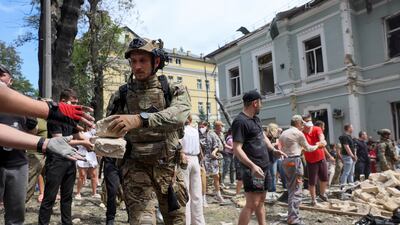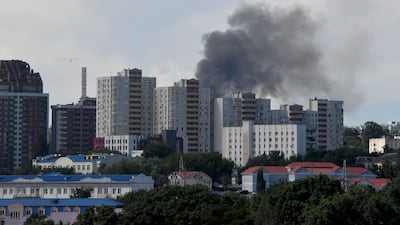As Nato leaders assemble in Washington a leading military historian has warned that after 75 years of peace and prosperity there is growing reluctance among Europe’s youth to risk their lives defending their lifestyles.
Prof Richard Overy, one of the world’s leading authors on military history, has told The National that despite human advances, Europeans need to adjust to a new era of conscription, driven by the return of warfare between its states.
“In continental Europe young people view things differently as they've got a lot to lose,” said Prof Overy. “Military life is not built into the community the way it was in 1914 [at the outbreak of the First World War] and it will be very difficult to mobilise that kind of commitment for it again, but it is something that a lot are going to be asked to do.”
The academic predicts that on current trends, European capitals will struggle to get enough western young people to agree to conscription to deter the Russia threat, with his new book concluding that mankind will continue to fight wars indefinitely.
“We're still living in an age where war is one of the options that states reach for now and in the future,” he added.
In his latest book Why War?, the writer has become the first historian to delve into the causes of conflict between humans which has been occurring for at least the past 100,000 years.
Return of conscription
With the rapid rearming of Nato to deter Russia at the top of the Washington agenda, many countries in Europe are now looking to reinforce their depleted armies by reintroducing conscription.
Germany is close to bringing back the draft for the first time since 2011 to increase its armed forces from 181,000 to 203,000 and Britain’s Conservative Party had promised the first cohort of national service for 18-year-olds since 1960 if it had been re-elected.
Caveman warriors
The necessity for today’s armies stems from humans' inability to live in peaceful coexistence almost since the dawn of sentience.
Understanding the inclination to conflict is “tangled in wave after wave of inter-human fighting from as far back as we have records” which is why it will be part of our future as well as our past, the scholar writes in his highly absorbing and originally argued Why War?
While humans have often “forsworn war” following its appalling consequences, new circumstances always emerge that make it “inevitable or even desirable” and seemingly “a legitimate option”.
Humans have proven to be a belligerent species, with lethal intergroup violence evident since even since the Pleistocene era more than 12,000 years ago, before Homo sapiens dominated the world.
It almost certainly goes even further back with the discovery of hominin bones in Spain from 800,000 years that revealed 11 victims of cannibalism as “the earliest known evidence of warfare”.
More advanced warfare is found in remains from the Neolithic era, about 7,000 BCE, showing arrowheads lodged in vertebrae, crushed skulls, and decapitated skeletons.
Violence employed
The causes of war since ancient times are explored with the main motivation being the competition for resources, whether this is “seizing women from a neighbouring tribe” or expanding territory.
“That means when you face a particular danger or local resources drying up, in order for your community to survive you have to at times employ violence,” Prof Overy said.
As society evolved, a “sophisticated psychology” then emerged in which a solution to a problem or resources involved an outcome where “war becomes a permanent feature for humans”.
In the modern era, explored in his final chapter, Security, it concludes that the most important cause is when people are insecure, scared or frustrated and “the trigger point is so often the frontier between states, peoples and tribes”, he said.

That border, either in Gaza or Ukraine, is the permanent “unstable phenomenon” and “Israel’s fundamental insecurity means that its frontiers are always going to be a point of tension or conflict.”
While the professor believes that the likelihood of a Russian invasion of Europe is “greatly exaggerated” after 80 years of peace in Europe, young people know “they've got a lot to lose” by fighting and potentially dying in a war.
But crises were “unpredictable” and may well emerge over the course of this century “in which people suddenly realise that they have a responsibility to take part”.
He suggested that once soldiers are mobilised on to the front line they always find a way to “rationalise why you're there and that happens in every war situation”.
Deeply embedded
Although not biologically hard-wired to wage wars, mankind is likely to continue to do so indefinitely, as Prof Overy's “pessimistic conclusion” in the book is that war “is deeply embedded in the way in which the human species has developed”.
“And indeed, that's what evolutionary biologists and psychologists now argue, it is deeply embedded,” he writes. “It's not something that's just been invented to satisfy politicians.”
With a nod to the psychology behind warfare, the book’s title comes from letters between Albert Einstein and Sigmund Freud, in which they discussed whether there was a way of “delivering mankind from the menace of war”. Freud’s answer was “no”.
The capability of nuclear weapons to kill “tens of millions of people quickly and in grotesque ways” has deterred large-scale modern wars, said the 76-year-old historian, who began writing the book just before Russia invaded Ukraine.
With Russian President Vladimir Putin threatening nuclear strikes, Prof Overy warned of an escalation to nuclear confrontation but the hope was that “once you get to the dangerous part, you step back”.
However, conflicts such as those in Israel or Ukraine can easily intensify in violence that weakens people’s boundaries against bloodshed.
“Wars of the recent past start small then suddenly, other parties get dragged in, the war escalates and rapidly you reach all kinds of thresholds which allow you to bomb a city flat, when you would not have thought about doing that before the war started.”
The unpredictable individual
While humans might evolve to a point where wars become less likely, an inevitable but unpredictable outcome was the sudden rise of an individual going to war and unalterably shaping history.
The danger was that they appeared usually from modest backgrounds, which perhaps impels them to use their power for extreme ends.
“I was very struck that the one thing you can't really talk about theoretically is the individual who suddenly takes history by the scruff of the neck and shakes it violently,” said Prof Overy.
“This is the one we can't predict and may indeed happen again, the rise of somebody from very humble beginnings who manages to win a widespread following, and then embarks on a programme of extraordinary widespread and destructive warfare.”

Napoleon was a “grumbling, young recruit” who went to become emperor of France and conqueror of Europe. Genghis Khan, who violently swept all before him from Mongolia nearly to the heart of Europe had been a poor herder.
“And who would have predicted that Hitler became dictator of Germany and would wage a devastating world war?”
Mr Putin was not in that category as his actions were more predictable as he had been a “warmonger for most of his career”.
''Why War?' (Pelican Books, £20) by Richard Overy is available now in hardback.












